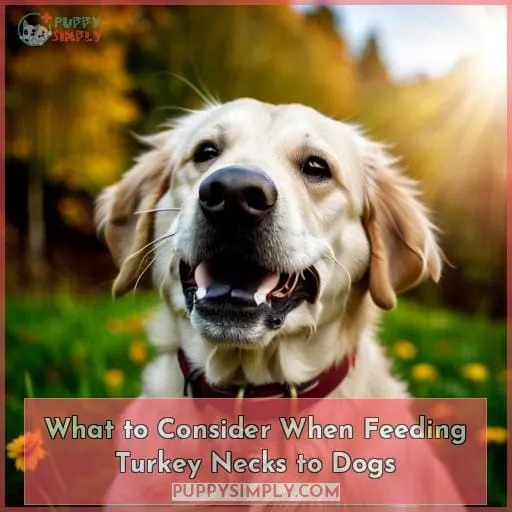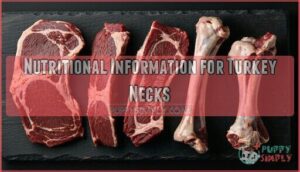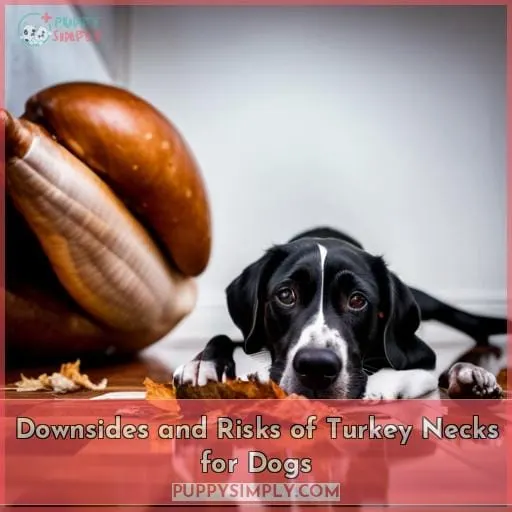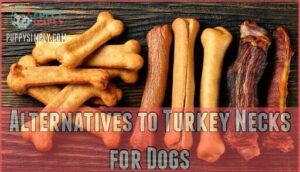This site is supported by our readers. We may earn a commission, at no cost to you, if you purchase through links.
 Wondering if it’s safe to feed your pooch turkey necks? The short answer is yes, as long as they’re uncooked and sourced responsibly.
Wondering if it’s safe to feed your pooch turkey necks? The short answer is yes, as long as they’re uncooked and sourced responsibly.
In this article, we’ll cover the benefits of feeding raw turkey necks to dogs, how to buy them safely, and what you need to consider when doing so.
We’ll also look at nutritional information for these treats, including protein content and calorie count, as well as any potential downsides or risks associated with their consumption.
With our guide in hand, you can make an informed decision on whether or not raw turkey neck chews are right for your canine companion!
Table Of Contents
- Key Takeaways
- Are Turkey Necks Safe for Dogs?
- Benefits of Turkey Necks for Dogs
- Where to Buy Turkey Necks for Dogs
- What to Consider When Feeding Turkey Necks to Dogs
- Nutritional Information for Turkey Necks
- Downsides and Risks of Turkey Necks for Dogs
- Alternatives to Turkey Necks for Dogs
- Frequently Asked Questions (FAQs)
- Conclusion
Key Takeaways
- Dogs can eat uncooked turkey necks as they provide nutrition such as protein, fat, calcium, phosphorus, vitamins, and minerals.
- Uncooked turkey necks support dental health, mental enrichment, and bone and joint health.
- It is important to adjust the portion based on the size of the dog and give 2-3 times per week.
- When sourcing uncooked turkey necks, it is recommended to buy from local butchers, markets, or reputable online retailers, and avoid imported products from China.
Are Turkey Necks Safe for Dogs?
Discover the answer to your question as you explore whether turkey necks are safe for your furry friend, and learn about their health benefits while also understanding potential risks.
Raw turkey necks can provide a nutritious meal for your dog; however, it’s important to recognize that raw meaty bones may pose some risk of bacteria or intestinal blockage if swallowed whole. It’s best practice to introduce these slowly into the diet and let them chew down themselves, avoiding swallowing large pieces.
The nutritional value of raw turkey necks includes high-quality protein, calcium, phosphorous, trace minerals, glucosamine, and chondroitin, which support joint health, helping prevent arthritis. They also give mental stimulation through chewing exercise, aiding in dental hygiene by removing plaque and tartar buildup on teeth when given 1/2-1 neck two to three times weekly (adjusting other meals accordingly).
However, it’s not without risks, so always monitor closely, especially gulpers, ensuring they do not swallow large pieces quickly.
Benefits of Turkey Necks for Dogs
Feeding your pup turkey necks can provide a variety of health benefits. Not only are they packed with protein, calcium, and phosphorus for a nutritious meal, but chewing on them helps support joint and mobility as well as dental hygiene.
Additionally, the act of chewing itself provides mental stimulation that supports overall well-being in dogs.
Nutritional Benefits
Turkey necks are a great way to nourish your pet with quality protein, calcium, and glucosamine while supporting their joint health and cleaning their teeth. Raw turkey necks provide high levels of calcium content, glucosamine, and chondroitin for improved joint health and mobility.
They also help reduce bacteria risks. Additionally, they provide mental stimulation through chewing, which improves dental hygiene.
Alternatives to raw meaty bones include chicken necks or dental chews like bully sticks. While these options can still be beneficial for dogs, they may not offer the same level of nutrition provided by turkey neck bones.
With all these benefits in mind, it’s easy to see why feeding your pup uncooked turkey necks is an excellent choice!
Joint and Mobility Benefits
Chewing turkey necks can help keep your pup’s joints healthy and agile, like a smooth-running machine. They provide the necessary calcium and phosphorus to support joint health, while also helping reduce inflammation that leads to arthritis.
Freeze-dried or dehydrated turkey necks are best for raw dog food diets as cooked bones splinter easily, which may lead to injury in dogs.
This natural dental care provides mental stimulation by chewing on these treats. It also cleans teeth in the process, reducing plaque and tartar buildup. Additionally, it provides nutrients such as glucosamine & chondroitin that help prevent joint problems from occurring down the line.
So give those paws of yours some love with some delicious raw turkey neck snacks!
Dental Benefits
You can help support your pup’s dental health by offering them freeze-dried or dehydrated turkey necks as part of their diet. Chewing on these raw chicken necks is an excellent way to keep teeth clean and remove plaque and tartar.
It provides both mental stimulation and physical exercise for dogs. Turkey necks are also a great choice for those on a raw food diet because they meet their dietary needs while satisfying their natural chewing habits.
If you don’t have access to fresh turkey neck, consider alternatives such as bully sticks or dental chews.
Mental and Overall Health Benefits
By providing mental and physical exercise, turkey necks can help keep your pup sharp while supporting their overall health. Quality control is important, so pet owners should be sure they are sourcing from reliable suppliers that follow animal welfare guidelines.
To ensure dietary needs are met, it’s essential to check flavor profiles and food safety standards, as well as storage recommendations for raw diet products such as turkey necks.
Where to Buy Turkey Necks for Dogs
To stock up on top-quality turkey necks for your pup, look to local farmers markets, butchers, or grocery stores. Online retailers like Raw Paws also offer a variety of raw feeding options, such as natural chews and bone broth, for those with limited access to fresh sources.
When sourcing turkey necks from any source, make sure they are free of preservatives and fillers by checking the label carefully.
Turkey neck treats make great rewards during training sessions. Their unique consistency helps keep teeth clean while providing mental stimulation and physical exercise. When giving these treats, be mindful and supervise gulpers carefully. Always introduce them slowly if your dog is new to raw diets.
What to Consider When Feeding Turkey Necks to Dogs
Feeding your dog turkey necks can provide them with a range of benefits, from mental enrichment to joint health. However, it is important to consider the source of these treats and take time to prepare them correctly for your pup.
Chewing on turkey necks can help keep their teeth clean in between brushing sessions, as well as providing beneficial nutrients like calcium and phosphorus.
Provenance (Source)
It’s important to check the source of your turkey necks before feeding them to your pet, as some may have been imported from China. Buyer caution is essential when it comes to sourcing quality raw chicken and turkey necks for dogs.
Ensure you read safety checks and nutrition facts on labels carefully, paying particular attention to where the poultry neck originated from. Ask vendors or butchers questions about dehydrated turkey necks too. This will help give you a better idea of their origin and whether they are safe for pets or not.
Remember, cooked bones can splinter and injure dogs – feed only raw meaty bones like fresh freeze-dried or dehydrated ones! With care taken in sourcing plus feeding tips followed correctly, these treats provide numerous benefits with minimal risk.
Preparation
When choosing a snack for your furry best friend, opt for fresh and natural raw meat like freeze-dried chicken necks. Preparation techniques should be considered to ensure safety from choking risks and bacteria control.
Cooked poultry bones splinter easily, so it’s important that the turkey neck remains uncooked or freeze-dried. For optimal nutritional balance, you may also want to consider other raw bone options, such as chicken feet, in addition to the turkey neck.
A raw turkey neck can provide essential nutrients while helping clean teeth and reduce plaque buildup. However, it’s important not to give too much of one item, as they all contain different levels of nutrition, which could throw off their diet if given regularly in large amounts.
To keep things balanced with good health benefits, offer a variety of safe snacks, such as these, occasionally instead of daily treats.
Teeth Cleaning
Chewing turkey necks helps keep your pet’s teeth healthy and strong by removing tartar! This makes it an ideal chew for dogs who are on a raw diet. The crunchy texture of the bone scrapes off plaque and food debris from their teeth while also providing essential nutrition facts.
To ensure proper dental hygiene, give your dog a turkey neck two to three times per week; adjust other meals accordingly. Make sure you supervise them as they chew, especially if they’re gulpers! Turkey necks provide mental stimulation that all pets need – just make sure you get one from reputable sources like farmers markets or butchers so that it is safe for feeding tips.
With its many benefits, why not let your pup try out this fun yet nutritious treat today?
Mental Enrichment
Munching on turkey necks provides mental stimulation and enrichment for your pup. Chewing the bones helps to sharpen its focus, which can reduce boredom-related chewing or digging behavior that may occur when it’s not properly stimulated.
Raw diet foods like turkey necks are also a great source of nutritional value. They contain calcium, phosphorus, trace minerals, and glucosamine, which help to support joint health in our canine companions.
Additionally, they provide dental health benefits by cleaning teeth and removing plaque/tartar.
Offering small pieces will ensure there isn’t any risk of choking or gastric obstruction associated with larger chunks. So, be sure to supervise while your pup enjoys their snack time! When introducing raw diets such as this into their routine, start slow.
Allow them to chew down themselves without swallowing large pieces. This way, you can reap all the wonderful benefits these treats offer while keeping both safety and nutrition in mind.
Joint Health
Consuming turkey necks provides your pet with high-quality protein, calcium, and other trace minerals to support joint health and help prevent arthritis. Turkey necks’ glucosamine and chondroitin also aid in reducing inflammation associated with joint issues.
Bone density is improved when our canines enjoy raw diets that include a turkey, as it helps maintain their chewing habits, which contribute to dental care benefits too! The trachea of the bird is especially beneficial for dogs who suffer from chronic joint pain or have difficulty walking due to stiff joints.
Including this treat in their diet may be just what they need for better overall mobility – plus, the added enrichment will keep them mentally stimulated too!
Nutritional Information for Turkey Necks
When it comes to feeding turkey necks to your dog, nutritional information is key. Protein and fat content are the building blocks for a healthy diet, while vitamins, minerals, and compounds provide essential nutrients.
Additionally, calorie content should be taken into account when planning meals for your pet. Finally, following an appropriate feeding guide tailored to their individual needs will ensure that you are providing them with the best nutrition possible.
Protein & Fat Content
Chomping down on some raw turkey necks can provide your pup with high-quality protein, fat, calcium, and other minerals – it’s like a vitamin IV for dogs!
A major benefit of feeding uncooked turkey necks is the preserved mineral content. Calcium and phosphorus levels are maintained during the cooking process, whereas bone structure is lost when cooked.
Muscle tissue also remains intact in its original form, which helps to ensure adequate nutrition for growing puppies or those on a raw diet. These products also contain trace amounts of glucosamine and chondroitin, which have many nutritional benefits, such as supporting joint health or preventing arthritis.
However, due to their hard nature, they may cause choking hazards if swallowed whole.
Vitamins, Minerals & Compounds
Chewing on raw turkey necks can provide your pet with essential vitamins, minerals, and compounds. Calcium aids in bone mineralization, phosphorus for calcium absorption, trace minerals for glucosamine synthesis, protein digestion, and chondroitin production.
Plus a little extra: Vitamin A helps support vision, while Vitamin E is an antioxidant that boosts the immune system. B-vitamins aid metabolism and energy levels, and Zinc supports healthy skin growth.
Calorie Content
Gobbling down turkey necks can provide your pup with a serving of high-quality protein, calcium, phosphorus, and other trace minerals – all in one tasty snack. Raw turkey necks are low calorie and an excellent source of nutrition for adult dogs following a raw diet.
The calorie content is, on average, 2 calories per gram, making it ideal for pups that need to watch their weight.
Turkey necks also provide essential vitamins necessary to meet dietary needs, like zinc, iron, and B vitamins, as well as omega fatty acids, which help promote healthy skin and coat.
When feeding your dog raw turkey necks, make sure you check the source carefully; avoid those from China due to its food safety regulations being lower than most countries.
With proper portion control when feeding this treat, you will ensure an optimum nutritional profile for your pup!
Feeding Guide
Nibble carefully when giving your pup turkey necks to ensure they get the nutritional benefits without risking any of the dangers. Properly store raw or freeze-dried turkey necks in an airtight container in the fridge.
Feed half to one whole neck two to three times per week for medium or large dogs. Rehydrate with equal parts water before serving if desired. Look for sources that don’t come from China as salmonella and e.
coli can be present. Ask your veterinarian about sourcing options available locally as well as potential risks such as intestinal blockages that can arise if not fed correctly.
Downsides and Risks of Turkey Necks for Dogs
Featuring high-quality protein, calcium, phosphorus, and more, turkey necks can be a great nutrient-rich treat for your dog. However, it’s important to note that dogs consuming uncooked turkey necks may face certain risks, such as bacterial contamination (e.
g., salmonella or E. coli), choking hazards, and constipation resulting from intestinal blockage caused by large pieces of neck bones that cannot be digested properly.
In addition to this potential threat posed by raw meat diets in general, there are times when you should avoid feeding your pup turkey necks altogether – if they’re gulpers or prone to swallowing large chunks without chewing them.
Bacterial Contamination (Salmonella and E.coli)
Consuming raw turkey necks can introduce bacterial contamination like Salmonella and E. coli to your pup, so proceed with caution. Hygiene practices should be applied when handling and preparing these treats, such as washing hands before and after contact with the food.
Keep any equipment used for processing clean by frequently sanitizing it or replacing it altogether if needed. It’s also recommended to follow food safety guidelines when storing the treat in an appropriate temperature range.
This will prevent bacteria from growing rapidly or producing toxins that may cause harm to your pet’s health if ingested.
If unsure of proper sanitation measures, consult a professional veterinarian about how best to maintain adequate levels of bacteria control while feeding uncooked poultry products like turkey necks safely at home.
Choking Hazard
Chewing too quickly could lead to a choking hazard, so be sure to supervise your pup as they enjoy their turkey neck. Raw diets require extra caution when it comes to oral care and protein intake because of the risk of bone splintering.
Turkey necks should only be given on a regular basis if you feel comfortable with raw dog food recipes and introducing them slowly into your pet’s diet in order to ensure safety while providing optimal nutrition benefits.
Constipation and Obstruction Risk
Swallowing too much of a turkey neck at once can cause constipation or an intestinal blockage, so be careful to supervise your pup as they chow down. Raw diet treats, such as turkey necks, should only be given in moderation and appropriate sizes for the size of the dog.
Chewing on bones can also lead to bone splintering, which may result in further health risks if ingested by the dog.
Alternatives, such as dental chews and bully sticks, are available that provide similar benefits with less risk involved than raw diets like uncooked turkey necks do. Therefore, it is important that owners know how to feed their dogs responsibly while still providing them with healthy treats like those mentioned above, rather than relying solely on raw food items like uncooked turkey necks without considering potential risks associated with them.
When to Avoid Feeding Turkey Necks
It’s important to avoid giving your pup turkey necks if they’re new to the raw diet or if they’re gulpers. This could lead to choking and intestinal blockage. Bone splintering may also occur when feeding cooked meat, so it’s recommended to offer dental chews or bully sticks instead of relying solely on turkey necks.
While turkey necks provide an excellent source of protein and other nutrients for your pet, there are still risks associated with feeding them regularly. These risks should be taken into account before introducing turkey necks into their diet.
With proper supervision and a gradual introduction process, you can help ensure that your dog enjoys all the benefits without risking any potential harm from consuming turkey necks.
Alternatives to Turkey Necks for Dogs
For a tasty, nutritious alternative to turkey necks for your pup, try freeze-dried chicken necks that provide an amazing flavor and texture. Freeze-drying is the process of removing moisture from food so it can be stored without requiring refrigeration or spoilage.
It preserves most of the nutritional content found in raw meat while also making it easy to transport and store.
Other alternatives include:
- Bully sticks: These are made from beef pizzle (penis), which makes them irresistible to dogs! They are high in protein but low in fat and help keep teeth clean as well as freshen breath naturally.
- Dental chews: These chews have been specially designed with dental health benefits like cleaning tartar off teeth while providing essential nutrients like calcium for healthy bones and joint support.
- Cooked bones: Avoid cooked bones, as they splinter when being chewed on by a dog, causing potential injury or blockages if swallowed whole.
Chicken or turkey necks can make excellent treats too – just ensure they’re fresh sourced ingredients only! Providing these meats will give your pet an excellent source of vitamins including A and D, which helps promote overall growth, plus healthy skin and coat for active dogs who love running around outdoors often throughout the day!
For more information, check out our three free raw dog food recipes available online today.
Frequently Asked Questions (FAQs)
How much turkey neck should I give my dog?
Give your medium or large dog half to one whole turkey neck two to three times per week.
Are turkey necks suitable for small dogs?
Yes, small dogs can benefit from turkey necks too! Feed half to one neck two to three times a week for best results. Supervise your pup while they chew and introduce slowly if new to a raw diet. There are also alternatives like dental chews and bully sticks available for smaller breeds.
Is it necessary to rehydrate the turkey necks?
No, you don’t need to rehydrate turkey necks. Simply give your pup one-half to a whole neck two or three times a week for dental health and mental stimulation. However, supervise gulpers closely as large pieces can cause choking or blockages.
How often should I feed my dog turkey necks?
Feed your dog half to one whole turkey neck two to three times per week, adjusting other meals accordingly.
Is there a difference between raw and cooked turkey necks?
Raw turkey necks provide more beneficial nutrients than cooked. Chewing raw bones helps clean teeth and provides mental stimulation, while cooked bones can splinter and injure your pup.
Conclusion
With the many benefits of turkey necks for dogs, it’s no surprise that this treat has become a popular choice. They provide essential vitamins, minerals, and compounds that are necessary for your pup’s overall well-being.
Like any treat, however, there are risks to consider, such as bacterial contamination, choking, and the potential for intestinal blockage. It’s best to buy from a trusted source and supervise your dog while they chew to ensure their safety.
With a little caution and common sense, you can give your dog a delicious and nutritious treat that will keep them happy and healthy.













